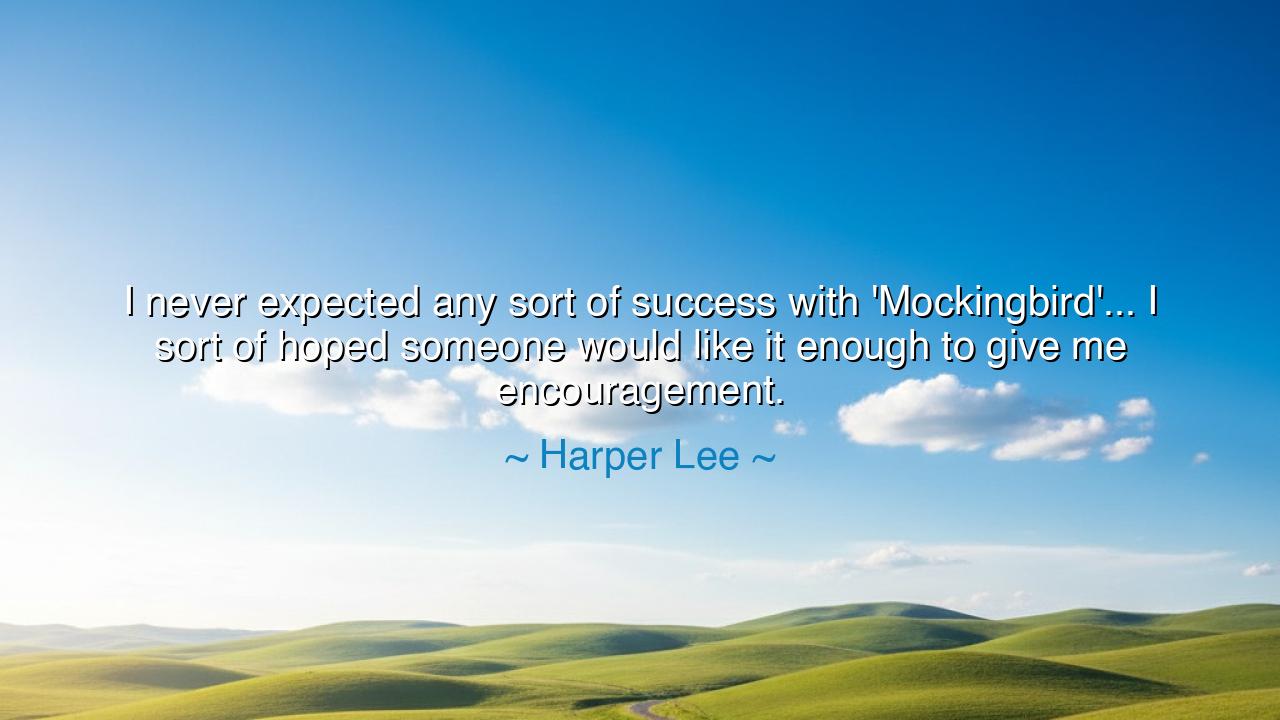
I never expected any sort of success with 'Mockingbird'... I
I never expected any sort of success with 'Mockingbird'... I sort of hoped someone would like it enough to give me encouragement.






The great writer Harper Lee, whose words still echo across the generations, once confessed: “I never expected any sort of success with Mockingbird... I sort of hoped someone would like it enough to give me encouragement.” In this humble statement lies a profound truth about the nature of creation, the uncertainty of the artist’s path, and the power of hope. For the one who creates does not often set out seeking glory; rather, they seek connection—someone, somewhere, to see what they have made and to whisper back: yes, your voice matters.
The ancients knew well that greatness is rarely born of certainty. The poet does not write because he knows his words will last, but because he must release what burns within him. So it was with Harper Lee. She did not craft To Kill a Mockingbird expecting fame or prizes. She wrote from the wellspring of her soul, offering a story of justice, innocence, and compassion in a divided world. The success that followed was not her aim, but her surprise. Her true longing, as she admits, was not for riches, but for encouragement—a sign that her voice was heard, her truth received.
In her words we see the universal struggle of the artist, the seeker, the dreamer. For who among us has not doubted? Who has not wondered whether our work, our effort, our voice is enough? Harper Lee reminds us that even those whose creations shake the world once longed simply for a hand on the shoulder, for reassurance. This is the human heart laid bare: we labor, we strive, but in the end we crave only to be known, to be affirmed, to be told that our work is not in vain.
History offers many echoes of this truth. Think of Vincent van Gogh, who painted with fire in his soul but lived in poverty, unrecognized by the world of his time. He sold only one painting in his life, yet he pressed onward, hoping perhaps for a word of encouragement, though it rarely came. Today his works are treasures, admired by millions, proof that greatness may not always be recognized in its season. The artist, like Lee, often creates in uncertainty, guided only by hope.
Yet Harper Lee’s story also teaches us another truth: that the act of creation itself carries power, whether success follows or not. When Mockingbird was released, it did more than bring her recognition—it gave the world a mirror to its own soul. It forced a nation to see its injustices, and inspired generations to seek compassion and fairness. Lee may have sought only a little encouragement, but her courage in offering her story changed the world. So often, what begins in smallness becomes a force of greatness beyond imagining.
The lesson for us, then, is this: do not create or labor only for success, for it is fickle and uncertain. Instead, create because the truth within you demands to be spoken. Seek not applause, but authenticity. And when doubt overwhelms you, remember Harper Lee’s humility—how even she did not know what her words would mean, yet she offered them anyway. That offering, not the outcome, is the true measure of courage.
Practically, this means daring to share your work, no matter how unpolished or uncertain it feels. It means seeking out those who will give you honest encouragement, and in turn offering encouragement to others, for you never know whose spirit you may lift. Above all, it means trusting that the value of your voice does not lie in numbers or fame, but in the truth it carries.
Thus, Harper Lee’s quiet confession becomes a teaching for all generations: do your work with sincerity, release it into the world, and let go of expectation. Success may come, or it may not, but the act of creation itself is noble, and encouragement, when found, is enough to sustain the journey. For even the smallest seed of hope can blossom into a tree that shelters the world.






AAdministratorAdministrator
Welcome, honored guests. Please leave a comment, we will respond soon